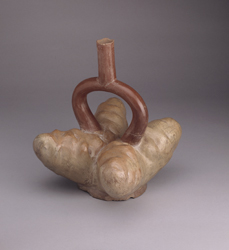 W
WThe potato was the first domesticated vegetable in the region of modern-day southern Peru and extreme northwestern Bolivia between 8000 and 5000 BC. Cultivation of potatoes in South America may go back 10,000 years, but tubers do not preserve well in the archaeological record, making identification difficult. The earliest archaeologically verified potato tuber remains have been found at the coastal site of Ancón, dating to 2500 BC. Aside from actual remains, the potato is also found in the Peruvian archaeological record as a design influence of ceramic pottery, often in the shape of vessels. The potato has since spread around the world and has become a staple crop in many countries.
 W
WThe islands of Newfoundland and Ireland, in addition to sharing similar northern latitudes and facing each other across the Atlantic Ocean, also had in common, during the middle of the 19th century, a heavy dependence on a single agricultural crop, the potato--a dependence that allowed the same blight that precipitated the Great Famine in Ireland to wreak havoc on this former British colony as well. Though acute, and the source of great suffering, the famine in Newfoundland lasted for fewer years than its Irish contemporary, which extended from 1845 to 1849. Beginning a year later, in 1846, it ended with the return to prosperity of the local fisheries in the spring and summer of 1848.
 W
WThe War of the Bavarian Succession was a dispute between the Austrian Habsburg Monarchy and an alliance of Saxony and Prussia over succession to the Electorate of Bavaria after the extinction of the Bavarian branch of the House of Wittelsbach. The Habsburgs sought to acquire Bavaria, and the alliance opposed them, favoring another branch of the Wittelsbachs. Both sides mobilized large armies, but the only fighting in the war was a few minor skirmishes. However, thousands of soldiers died from disease and starvation, earning the conflict the name Kartoffelkrieg in Prussia and Saxony; in Habsburg Austria, it was sometimes called the Zwetschgenrummel.
 W
WThe European Potato Failure was a food crisis caused by potato blight that struck Northern and Western Europe in the mid-1840s. The time is also known as the Hungry Forties. While the crisis produced excess mortality and suffering across the affected areas, particularly affected were the Scottish Highlands and, even more harshly, Ireland. Many people starved due to lack of access to other staple food sources.
 W
WThe Highland Potato Famine was a period of 19th-century Highland and Scottish history over which the agricultural communities of the Hebrides and the western Scottish Highlands saw their potato crop repeatedly devastated by potato blight. It was part of the wider food crisis facing Northern Europe caused by potato blight during the mid-1840s, whose most famous manifestation is the Great Irish Famine, but compared with its Irish counterpart, it was much less extensive and took many fewer lives as prompt and major charitable efforts by the rest of the United Kingdom ensured relatively little starvation. The terms on which charitable relief was given, however, led to destitution and malnutrition amongst its recipients. A government enquiry could suggest no short-term solution other than reduction of the population of the area at risk by emigration to Canada or Australia. Highland landlords organised and paid for the emigration of more than 16,000 of their tenants and a significant but unknown number paid for their own passage. Evidence suggests that the majority of Highlanders who permanently left the famine-struck regions emigrated, rather than moving to other parts of Scotland. It is estimated that about a third of the population of the western Scottish Highlands emigrated between 1841 and 1861.
 W
WThe War of the Bavarian Succession was a dispute between the Austrian Habsburg Monarchy and an alliance of Saxony and Prussia over succession to the Electorate of Bavaria after the extinction of the Bavarian branch of the House of Wittelsbach. The Habsburgs sought to acquire Bavaria, and the alliance opposed them, favoring another branch of the Wittelsbachs. Both sides mobilized large armies, but the only fighting in the war was a few minor skirmishes. However, thousands of soldiers died from disease and starvation, earning the conflict the name Kartoffelkrieg in Prussia and Saxony; in Habsburg Austria, it was sometimes called the Zwetschgenrummel.
 W
WThe Potato Control Law (1929) was based upon an economic policy enacted by U.S. President Herbert Hoover's Federal Emergency Relief Administration at the beginning of the Great Depression. The policy became a formal act in 1935, and its legislative sponsors were from the state of North Carolina. Hoover's presidential successor, Franklin D. Roosevelt, signed the Act into law on August 24, 1935.
 W
WThe "potato riots" were the mass anti-serfdom movement of udelnye krestyane in 1834, and of state peasants in 1840–44, in Russian Empire. The reason for the rebellion was the coercive introduction of potato cultivation. The government selected the best fertile sections for potatoes from peasant lands. Authorities enforced brutal punishments for the non-fulfillment of the orders and assessed different requisitions. In 1834 unrest flared up in Vyatsky and Vladimir provinces, but it reached its height among the state peasants in 1840–44. Riots appeared simultaneously and they were partly in response to Pavel Kiselyov's reforms of state villages (1837–41). In the provinces of Ural and the lower Volga Region more than 500,000 peasants rose up destroying sowings of potatoes, and thrashing officials. They arbitrarily re-elected wardens, and attacked punitive detachments with weapons. Aside from ethnic Russians, participants in the riots included the Mari population, Chuvashes, Udmurts, Tatars, and Komi. The government sent troops to suppress the riots. In a number of places, peasants were shot. Thousands of rebels were convicted, and exiled into Siberia or forcibly drafted as soldiers.
 W
WThe War of the Bavarian Succession was a dispute between the Austrian Habsburg Monarchy and an alliance of Saxony and Prussia over succession to the Electorate of Bavaria after the extinction of the Bavarian branch of the House of Wittelsbach. The Habsburgs sought to acquire Bavaria, and the alliance opposed them, favoring another branch of the Wittelsbachs. Both sides mobilized large armies, but the only fighting in the war was a few minor skirmishes. However, thousands of soldiers died from disease and starvation, earning the conflict the name Kartoffelkrieg in Prussia and Saxony; in Habsburg Austria, it was sometimes called the Zwetschgenrummel.
 W
WThe Propitious Esculent: The Potato in World History is a book by John Reader outlining the role of the potato in world history. It was also published under the titles The Untold History of the Potato and Potato: A History of the Propitious Esculent.